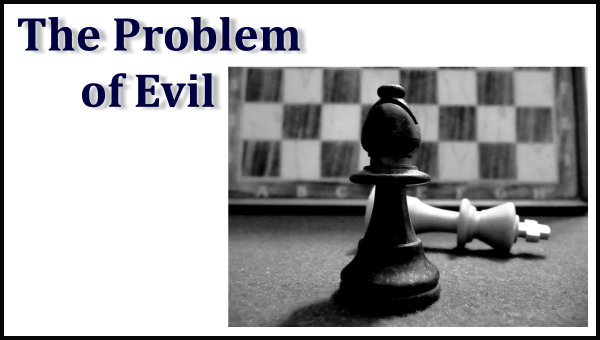By Tyson Thorne

In high school I was visiting the girl who lived next door to my grandparents. A bit cliché I know, but she was very pretty and from a Christian family. Her cousin was visiting and, being into chess in a big way, he asked for a game while I was waiting for her to finish getting ready for our date. I’m not much of a chess player, but consented. He beat me solidly and afterward very logically told me why. It wasn’t a boast, he wasn’t trying to belittle me, he simply wanted to explain.
“When we first started I had no idea how good of a player you were. You started out well enough, so well that when you started making moves that didn’t make any sense, I thought maybe you knew a strategy I didn’t. I played cautiously. Later I realized those moves really didn’t make any sense and that you didn’t know what you were doing, so I cleaned up.”
Why am I telling you this? Because God is good, even if we can’t always see it. A friend of mine is asking some tough questions, one of which is, “why doesn’t God do more to defeat evil in this world? Is he incapable? Unwilling? Or maybe he doesn’t exist.” The problem of evil is perplexing him to no end, and the usual answers aren’t good enough. What are the usual answers? Glad you asked!
God created heaven and earth perfect. Lucifer rebelled bringing evil into the heavens and man sinned bringing evil into our world. God is not the author of sin, Lucifer and humanity are. The problem for many is that, since God knew what was going to happen he therefore knew evil would present and is ultimately the cause of evil. This is a problem that has perplexed humanity and the best we can say is that God’s relationship to the creation of evil is remote, that is he did not create it but allowed it. Lucifer and our relationship to evil is proximate, that is we directly commit evil acts. To put it another way, God may permit evil but we commit evil.
Couldn’t God have created a world where we can be ourselves (i.e. with free will) and not bring evil into the world? The short answer is: evidently not or he would have. This answer means that evil has a role to play in this world. Which brings us back to the chess match. A chess master has no reason to think that he cannot see the reason behind the moves a novice makes. On the other hand, the novice has every reason to believe that he cannot discern the reason behind every move the chess master makes, even if it is to sacrifice a key piece (evil) in order to win the game (good).
What this means is that our failure to see the point of suffering is not a reason to believe that there is none. It also means that the problem of evil is not an argument against the existence of a good, all powerful God. The debate comes down to whether or not we have reason to believe that God exists. If we have reason to believe he does exist then we must also accept that there is a purpose for evil and suffering. Of course we may also conclude there is no reason to assume God’s existence, in which case suffering and evil are representative of chaos only and serve no purpose. The existence of God is not a question we will answer in this post.
Assuming God exists and therefore there is a role that evil plays in this world, can we discern what that role is? As a novice player, all we can know for certain is that it must lead to the eventual destruction of evil (that is, winning the game). There may be other reasons as well. Since God does and will ultimately overcome evil, and since we are created in his image, it may follow that some evil is designed to teach us to overcome and defeat evil too. That is just one example, I’m sure you can think of others and if you do please share them in the facebook group for Think-Biblically. I leave you to ponder two passages from the Bible:
For I consider that our present sufferings cannot even be compared to the glory that will be revealed to us. (Romans 8.18)
And we know that all things work together for good for those who love God, who are called according to his purpose (Romans 8.28).
The Lord is not slow concerning his promise, as some regard slowness, but is being patient toward you, because he does not wish for any to perish but for all to come to repentance. (2 Peter 3.9)
http://think-biblically.com/8-blog/275-jonathan-smith
|
|
